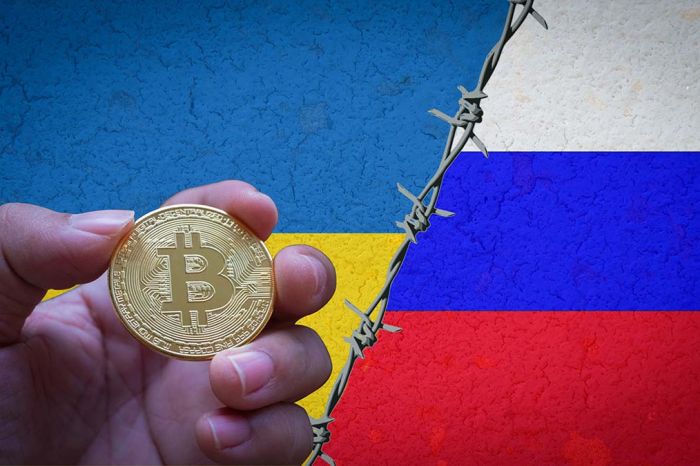The invasion of Ukraine has shown many different things. It showed that freedom and peace should never be taken for granted, that the war can happen at any time, that solidarity, help, and compassion of other countries are necessary, that having a true leader encourages the whole nation, etc. And amongst others, this conflict also showed that Bitcoin is a neutral, apolitical tool that can be used at any time due to its very nature.
The good, the bad, and the apolitical
1.Bitcoin can be used by Russia to diminish the effect of financial sanctions by EU or USA.
2.Ukraine received approximately 40 million dollars through Bitcoin and other cryptocurrencies.
These two statements are vastly different and will probably have most of you feel a variety of feelings. While the first one might have a context of anger, disbelief, or disappointment in Bitcoin, the other can lead to feelings of happiness, compassion, or joy.
And maybe, you feel no difference between them. You do not see any reason why the usage of Bitcoin should be different for a Russian person or a donor to Ukraine and thus do not have different feelings about either of the statements. And that is exactly the same as the “approach” of Bitcoin.
Bitcoin does not divide people into Russians, Ukrainians, Belarussians, Polish, etc. Bitcoin does not discriminate against any nation favouring other nation. In its core, Bitcoin is a purely apolitical, neutral tool.
What is Bitcoin?
While the point of this article is not to introduce or explain Bitcoin, one of the main characteristics, or description of it, will definitely stand out. And that is the nature of what Bitcoin actually is. The more people you ask this question, the broader the spectrum of answers you will get.
For some, Bitcoin is money, a store of value, or a medium of exchange. For others, it is the future of finance and the new reserve currency. And then there are also people who see it as a Ponzi scheme, worthless digital “rat-poison,” or nothing more than a bubble (yes, there are people who actually still believe this).
Is an axe or a hammer inherently good or bad?
While some of these claims might be true (only time will tell), inherently, Bitcoin is just a tool. And that is something that the conflict between Russia and Ukraine, as well as the Freedom Convoy in Canada, has shown perfectly. Bitcoin can be thus thought of as any other tool. Take, for example, an axe or a hammer.
Both an axe and a hammer can be used to build things. These tools are used to create structures that improve our daily lives in numerous ways. Therefore, this should mean that these tools are “inherently” good, right? Well, that is not the case because both an axe and a hammer can also be used to destroy stuff and even hurt or kill people. If this is the case, these tools should definitely be viewed as bad, right? Well, yes and no again.
An axe and a hammer are just instruments, accessories of sorts, which cannot be assigned their innate “goodness” or “badness”. These are just tools that anyone can access and use them in a way that they believe will be prosperous or useful to them. And while some of these usages might end up being immoral or illegal, no politician would come forward and try to declare axes or hammers illegal just because their neighbour used a hammer to damage their shared fence.
Bitcoin as a tool
The same applies to many things. This logic can be used with wheels, cars, the internet, money, and yes, even with Bitcoin. The inherent division of tools into good and bad can lead to flawed decisions or mistakes, especially if they are done based on particular situation or context. And this is where the first two lines of the article come back.
Bitcoin as a “bad tool”
Suppose someone judged Bitcoin solely because it may help Russians evade financial sanctions imposed by EU or USA (and they believe that the sanctions are in place and that Russia should be punished for the invasion). In that case, they might start to think that Bitcoin is bad. Why wouldn’t it be if it’s helping the “bad guys.”
Politicians who believe that this is the case might want to speed the regulations process of cryptocurrencies up and might be even looking for harsher restrictions. There were already some statements by EU politicians who believe that cryptocurrencies should be regulated much more heavily just so that Russia cannot evade the sanctions.
Moreover, Ukraine´s Vice Prime Minister, Mykhailo Fedorov, asked eight cryptocurrency exchanges to block the addresses of Russian users. These were for instance Binance, Kraken, Coinbase and others. Most of these exchanges are now reluctant to do such measures, with Jesse Powell, CEO of Kraken, stating the following:
“I understand the rationale for this request, but, despite my deep respect for the Ukrainian people, Kraken cannot freeze the accounts of our Russian clients without a legal requirement to do so.”
Bitcoin as a “good tool”
On the other hand, many people could simply jump to the conclusion that Bitcoin is a good tool just because it was used for donations of over 40 million dollars to Ukraine and different organisations helping the country (Bitcoin and all the other cryptocurrencies combined).
Moreover, countless different stories have already been told about how Bitcoin helped Ukrainians fly away from the country or leave the country with at least some monetary value and not “empty-handed.” You can find such stories, for instance, here or here.
Even the government of Ukraine has made it clear that the support of Bitcoin and other cryptocurrencies is more than welcome. The official cryptocurrency addresses of the country have seen donations of over 20 million dollars, mainly in Bitcoin and Ethereum. At the same time, donation options in Tether and Polkadot are also available.
Stand with the people of Ukraine. Now accepting cryptocurrency donations. Bitcoin, Ethereum and USDT.
BTC – 357a3So9CbsNfBBgFYACGvxxS6tMaDoa1P
ETH and USDT (ERC-20) – 0x165CD37b4C644C2921454429E7F9358d18A45e14
— Ukraine / Україна (@Ukraine) February 26, 2022
The good, the bad, and the apolitical
And here is where it all comes together. While the perception of Bitcoin can change based on the circumstances or the overall story, it only changes due to the actions that people take. Inherently, Bitcoin is neither good nor bad. Many politicians will try to persuade you to believe either one of these statements. Bitcoin is simply neutral, apolitical. The view on how it is used and whether it brings any value to society determines whether people perceive it as a good or a bad tool.
However, the truth is that Bitcoin is neither. It is simply a tool that can be used by people the way they need, desire, or want. Thus, trying to portray Bitcoin at either extreme of this scale would not be logical, right, or just. No matter whether you see Bitcoin as a neutral payment network, unseizable storage of value, free monetary system, or a decentralised, digital version of gold, in its very essence, Bitcoin is just a tool. Let´s hope that it will be mostly used to do good.
Disclaimer: This article is solely meant to describe the characteristics of Bitcoin and its usability in recent times. Investro still believes that the war is bad and will not solve anything and hopes that the end of the conflict is near, and so is the peace.












Comments